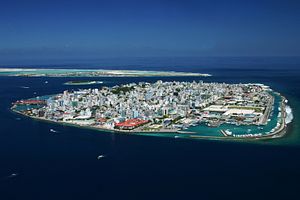As in past years, 2016 will see more than a million holidaymakers make their way to the Maldives. While vacationers are whisked away to luxury islands, very few will get a glimpse of the worsening political crisis that is eating away at the nascent democracy.
In 2008, Maldives held its first democratic elections and instated Mohamed Nasheed as the country’s president. However, the democratic tailwinds were short-lived and in less than three years Nasheed was forced to resign. In 2013, presidential elections were held and, under dubious circumstances, Abdulla Yameen came to power.
Since then the country has been in a tailspin of political turmoil, marred by mounting allegations of corruption, human rights violations, and a general disregard for democratic principles. Shrinking political space for the opposition, arbitrary detention and custody of political leaders, and a near-collapse of separation of powers and independence of the judiciary are some of highlights of the present political dispensation. Democratic politics has taken a nose-dive that has prompted the Commonwealth— of which the Maldives is a member state— to convene twice already this year to discuss the country.
The arrest and conviction of former President Nasheed for 13 years on terrorism charges has already gained widespread notoriety. The unfair trial and complete disregard for established legal procedures gathered flak from the international media. It took less than 20 days to conclude Nasheed’s trial and his legal team was not allowed to call witnesses of its own. Two out of the three judges hearing the case, as well as the prosecutor-general, were witnesses for the prosecution. The process went against the grain of international standards for fair trial and this was expressed in no uncertain terms by the UN Working Group on Arbitrary Detention, which urged Nasheed’s immediate release.
Similarly, former Defense Minister, Col. Nazim, leader of the opposition Adhaalat Party, Sheikh Abdullah, and former Vice President Ahmed Adheeb have also been convicted for decade-long terms under the country’s draconian anti-terror laws. Incidentally, most of those charged under the country’s anti-terror laws happen to be political prisoners.
Meanwhile, President Yameen’s Progressive Party of the Maldives (PPM), which commands a majority in the Maldivian Parliament, has sought the legislative route to severely curb fundamental freedoms in the country. The infamous Defamation and Freedom of Speech Act, which received widespread international condemnation, criminalizes defamation. The law imposes hefty fines on those whose views are believed to contradict tenets of Islam, defame a person, violate social norms, and threaten national security. So far no one has been charged under the new law but nonetheless its chilling effect is felt by journalists and citizens alike.
Freedom of speech and expression, freedom of peaceful assembly and association, and free and fair elections are the cornerstones of democracy. However, none of these fundamental values have found favor with the present administration. Rather, the government has become more brazen through intimidation of critics, apathy toward rule of law and unbridled corruption, especially in its tourism deals.
A recent expose by Al Jazeera television reveals the former vice president’s part in an arson attack on a television station, the president’s involvement in suppressing the investigation into the enforced disappearance of journalist Ahmed Rilwan, and the misappropriation of state funds at the highest levels of the government. The release of the documentary has led to great discomfort within the political establishment and senior government officials threatened criminal proceedings against those who contributed to the documentary.
The Commonwealth Ministerial Action Group (CMAG)—a group of ministers tasked with addressing serious or persistent violations of Commonwealth political values— will meet for the third time this year on September 23, 2016. The Maldivian government is certainly sensitive to CMAG’s verdict on the state of affairs in the country. Yameen and his ministers have been lobbying hard with the Commonwealth countries of Pakistan, India, and Malaysia, ostensibly to avoid a negative judgement.
For the Commonwealth to prove itself to be more than a post-colonial nostalgic circle, it must express its intent beyond words. Indeed, the CMAG meeting on Friday would be a test of its commitment toward the values of democracy, human rights and fundamental freedoms.
Trinanjan Radhakrishnan is a Program Officer (Human Rights Advocacy) at Commonwealth Human Rights Initiative (CHRI), New Delhi. His areas of interests are: human rights, culture and conflict, transitional justice and post-conflict democratisation, in Sri Lanka, Maldives and South Asia. He tweets at @trinanjan_

































